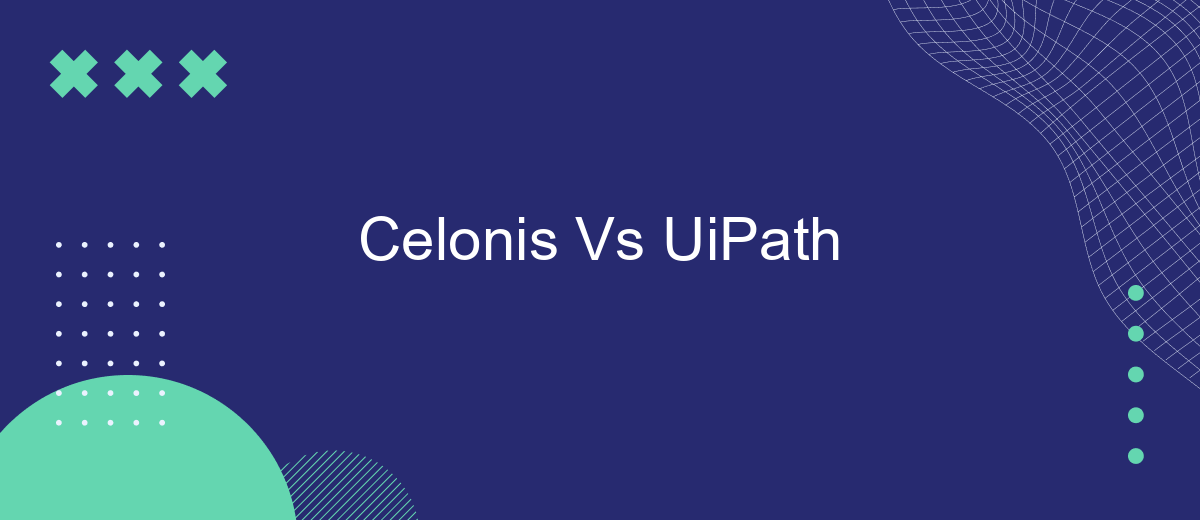In the rapidly evolving landscape of process automation, two giants stand out: Celonis and UiPath. Both offer powerful tools to streamline operations and enhance efficiency, but they cater to different aspects of automation. This article delves into a detailed comparison of Celonis and UiPath, exploring their unique features, strengths, and potential use cases to help businesses make informed decisions.
Executive Summary
Celonis and UiPath are leading platforms in the realm of process mining and robotic process automation (RPA) respectively. Both offer unique capabilities that can significantly enhance business efficiency and operational effectiveness. Celonis excels in process mining, providing deep insights into business processes, while UiPath specializes in automating repetitive tasks to save time and reduce errors.
- Celonis: Focuses on process mining and optimization.
- UiPath: Specializes in robotic process automation.
- Integration: Both platforms can be integrated for comprehensive process management.
- SaveMyLeads: Facilitates seamless integration between various business applications and platforms.
Choosing between Celonis and UiPath depends on your specific business needs. If your primary goal is to gain insights and optimize processes, Celonis is the better choice. For automating routine tasks and improving efficiency, UiPath is more suitable. Additionally, using services like SaveMyLeads can further streamline the integration process, ensuring that your business applications work harmoniously together.
Company Overview

Celonis, founded in 2011, is a leading process mining and execution management software company that helps organizations unlock their full execution capacity. By leveraging advanced data analytics and AI, Celonis provides deep insights into business processes, identifying bottlenecks and inefficiencies. This enables companies to optimize their operations and drive significant improvements in performance and productivity. Headquartered in Munich, Germany, Celonis serves a diverse range of industries including manufacturing, finance, and healthcare.
UiPath, established in 2005, is a global leader in robotic process automation (RPA). The company's platform allows organizations to automate repetitive tasks, thereby enhancing efficiency and reducing human error. UiPath offers a comprehensive suite of tools for building, managing, and running automation workflows, making it easier for businesses to scale their automation efforts. Based in New York City, UiPath has a strong presence worldwide and caters to various sectors such as banking, insurance, and telecommunications. For seamless integration of automation solutions, services like SaveMyLeads can be utilized to connect UiPath with numerous other applications, ensuring smooth data flow and operational harmony.
Product Capabilities

When comparing Celonis and UiPath, it's crucial to consider their product capabilities. Both platforms offer robust tools for process automation and optimization, but they differ in their specific functionalities and strengths.
- Process Mining: Celonis excels in process mining, providing detailed insights into business processes and identifying inefficiencies. UiPath also offers process mining, but it is not as comprehensive as Celonis.
- Robotic Process Automation (RPA): UiPath is a leader in RPA, enabling the automation of repetitive tasks across various applications. Celonis has RPA capabilities but focuses more on process optimization.
- Integration Capabilities: Both platforms support integrations with other systems. For instance, SaveMyLeads can be used to set up integrations, enhancing the automation workflows in both Celonis and UiPath.
- Analytics and Reporting: Celonis provides advanced analytics and reporting tools, offering a deep dive into process performance. UiPath also offers analytics but is more focused on automation metrics.
In summary, Celonis is ideal for organizations looking to optimize and gain insights into their processes, while UiPath is best suited for automating tasks and workflows. The choice between the two depends on the specific needs and goals of the organization.
Customer Reviews and Case Studies

Customer reviews for both Celonis and UiPath highlight their strengths in process optimization and automation, respectively. Celonis is praised for its powerful process mining capabilities that provide deep insights into business operations. Users appreciate its ability to identify inefficiencies and suggest improvements, making it a valuable tool for enhancing productivity.
On the other hand, UiPath receives accolades for its user-friendly interface and robust automation features. Customers find it easy to deploy and use, which significantly reduces the time and effort required to automate repetitive tasks. The platform's extensive library of pre-built automation components is another frequently mentioned benefit.
- Celonis: Excellent for process mining and operational insights.
- UiPath: User-friendly with a comprehensive automation library.
Case studies for both platforms demonstrate their effectiveness across various industries. For instance, a retail company using Celonis was able to streamline its supply chain, resulting in a 20% reduction in operational costs. Similarly, a financial services firm leveraged UiPath to automate data entry processes, achieving a 30% increase in processing speed. For seamless integration, services like SaveMyLeads can further enhance the capabilities of both platforms, ensuring smooth data flow between systems.
Pricing and Licensing
When it comes to pricing and licensing, Celonis and UiPath have different approaches tailored to their unique offerings. Celonis operates on a subscription-based model, with pricing dependent on the scale and complexity of the processes being analyzed. This often includes a combination of software licenses, cloud infrastructure, and professional services. Celonis provides a transparent pricing structure, allowing businesses to scale their usage as needed, which can be particularly beneficial for large enterprises with evolving needs.
UiPath, on the other hand, offers a more flexible licensing model that includes options for attended and unattended robots, as well as a variety of add-ons and services. Their pricing is generally based on the number of robots and the specific capabilities required. For businesses looking to streamline integration processes, services like SaveMyLeads can be invaluable. SaveMyLeads offers automated integration setups, ensuring that UiPath's bots can seamlessly connect with other systems and applications, thereby enhancing overall efficiency and reducing manual intervention.
- Automate the work with leads from the Facebook advertising account
- Empower with integrations and instant transfer of leads
- Don't spend money on developers or integrators
- Save time by automating routine tasks
FAQ
What are the primary differences between Celonis and UiPath?
Can Celonis and UiPath be used together?
Which industries benefit the most from using Celonis and UiPath?
How easy is it to integrate Celonis and UiPath with existing systems?
What kind of support is available for implementing Celonis and UiPath?
Would you like your employees to receive real-time data on new Facebook leads, and automatically send a welcome email or SMS to users who have responded to your social media ad? All this and more can be implemented using the SaveMyLeads system. Connect the necessary services to your Facebook advertising account and automate data transfer and routine work. Let your employees focus on what really matters, rather than wasting time manually transferring data or sending out template emails.

